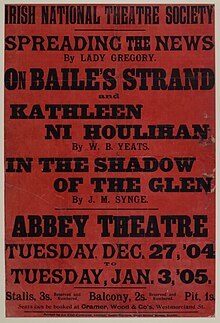This article needs additional citations for verification. (March 2010) |
| Kathleen ni Houlihan | |
|---|---|
 Poster for the opening of the Abbey Theatre, featuring Cathleen ni Houlihan (1904) | |
| Written by | William Butler Yeats Lady Gregory |
| Date premiered | 2 April 1902 |
| Place premiered | Dublin |
Cathleen ni Houlihan is a one-act play written by William Butler Yeats and Lady Gregory in 1902. It was first performed on 2 April of that year and first published in the October number of Samhain. Lady Gregory wrote the naturalistic peasant dialogue of the Gillane family, while Yeats wrote Cathleen Ni Houlihan's dialogue.[1]
Maud Gonne portrayed Cathleen ni Houlihan in the play's first performances at the Abbey Theatre. The play centres on the 1798 Rebellion. The play is startlingly nationalistic, in its last pages encouraging young men to sacrifice their lives for the heroine Cathleen ni Houlihan, who represents an independent and separate Irish state. The title character first appears as an old woman at the door of a family celebrating their son's wedding. She describes her four "beautiful green fields," representing the four provinces, that have been unjustly taken from her. With little subtlety, she requests a blood sacrifice, declaring that "many a child will be born and there will be no father at the christening". When the youth agrees and leaves the safety of his home to fight for her, she appears as an image of youth with "the walk of a queen," professing of those who fight for her: "They shall be remembered forever, They shall be alive forever, They shall be speaking forever, The people shall hear them forever."[2]
The premiere of Cathleen ni Houlihan initially confused Dublin audiences who had expected a comedic play due to the actor Willie Fay's prior association with comedies.[3] However, Gonne's reputation as an ardent nationalist helped them to understand the “tragic meaning” of her role, as described by Yeats.[3] By the third night the theatre was so crowded that customers had to be turned away.[3]
Yeats later expressed reservations about the play's nationalistic rhetoric of blood sacrifice, asking in a later poem, "The Man and the Echo," "Did that play of mine send out / Certain men the English shot?"[4]
- ^ Cannon Harris, Susan (2002). Gender and Modern Irish Drama. Indiana: Indiana University Press. pp. 61. ISBN 0-253-34117-5.
- ^ W. B. Yeats, Nine One-Act Plays (1937), p. 36.
- ^ a b c Quinn, Antoinette (2009). "Cathleen Ni Houlihan Writes Back". In Harrington, John P. (ed.). Modern and Contemporary Irish Drama. New York: W.W. Norton and Company. p. 431. ISBN 978-0-393-93243-0.
- ^ Macrae, Alisdair D. F. (1995). Dutton, Richard (ed.). W.B. Yeats: A Literary Life. Great Britain: Gill & MacMillan. p. 66. ISBN 0 7171 2225 5.